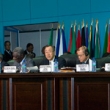The Seven Revolutions Initiative is a project at the Center for Strategic and International Studies (CSIS) to identify and analyze the key policy challenges that policymakers, business figures, and other leaders will face out to the year 2025. It is an effort to promote strategic thinking on the long-term trends that too few leaders take the time to consider.
In exploring the world of 2025, they have identified seven areas of change they expect to be most “revolutionary”:
 Revolution 1: Population
Revolution 1: Population
What effects will population growth/decline, aging, migration and urbanization have on our future world?
 Revolution 2: Resource Management
Revolution 2: Resource Management
What changes will we see in food, water & energy consumption/production?
 Revolution 3: Technology
Revolution 3: Technology
What changes are we going to see in computation, robotics, biotechnology & nanotechnology?
 Revolution 4: Information and Knowledge
Revolution 4: Information and Knowledge
How does the vast amount of data change how we learn and govern in the future?
 Revolution 5: Economic Integration
Revolution 5: Economic Integration
How is our economic landscape changing?
 Revolution 6: Conflict
Revolution 6: Conflict
How do we cope with a post-9/11 world? Or is there a new paradigm?
 Revolution 7: Governance
Revolution 7: Governance
What is the role of leaders, corporations and NGO’s in this new environment?
Each of these seven forces embodies both opportunity and risk in the years ahead. Together, they will transform the way we live and interact with one another. The SEVEN REVOLUTIONS website is constantly updated to reflect the latest data analysis and available technologies. It is a challenge to leaders—a challenge to think seriously about events that are over the horizon and a challenge to formulate and carry out policies in the near term to effect longer-range benefits.



Trackbacks/Pingbacks